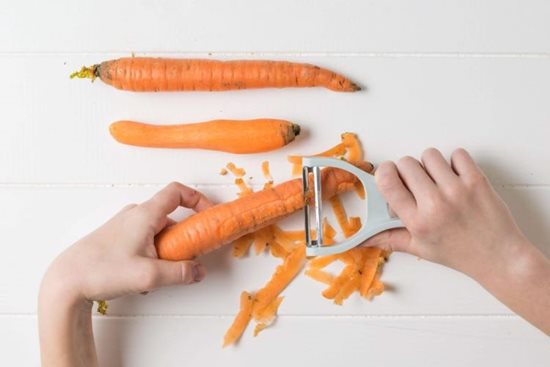The National Science Week 2021 theme was Food: Different by design. In this article, Hayley Bates from Little Scientists explores the science of playing with your food and how to do it mindfully, and shares a free STEM related incursion.
Don't play with your food
It's a refrain that I remember from my childhood, particularly on a hot Sunday afternoon with a full roast dinner plus apple pie that added to the food coma of the afternoon. The two-hour roast with its polite conversation was a killer. I remember mashing the spuds and mixing in the gravy to the right consistency, building a carrot wall to stop the gravy flooding the roast potatoes and lining up the overcooked peas under the knife to hide them from the ‘eat your vegetables’ police… I can still smell the pie in the oven.
You can imagine my surprise, when I recently heard my own voice saying, “Don’t play with your food”, despite vowing never to become my mother. But what’s wrong with playing with your food?
It is wrong in some, well, many, ways.
The droughts and bushfires left many facing food shortages in Australia. The Smith Family estimates that one in six Australian children and young people are living in poverty. It’s critical we are mindful of that. At home, food supplies may be a major cause of anxiety. If families can’t afford to put food on the table, the bag of flour used to make playdough or the pasta shapes stuck to cardboard at school may be upsetting. Different cultures have different attitudes to food and it is important that we, as early childhood professionals, respect and understand those differences.
However, playing with your food in another way may be useful.
- Investigating the taste, smell and texture of different apples during morning tea and eating them together can create happy memories and associations.
- Cooking and baking together can also inspire a joyful experience of food. You can try this basic scones recipe and add in some cheese, sultanas, dates or even chocolate chips.
- Sharing and experiencing other cultures through food is a wonderful way to promote and encourage cultural exchanges.
And who hasn’t seen the joy of discovery in the face of a ten-month-old covered in food? The textures, smells, tastes and visual delights of a bowl of spaghetti and sauce, not to mention the noise you can make with a spoon and bowl – that’s real learning. Joyful exploration may also help fussy eaters as they may be more open-minded about trying new foods in a relaxed atmosphere.
Keeping our eyes peeled for differences
A wonderful activity we’ve occasionally done in our Engineering workshop is using various vegetable and fruit peelers and comparing them. Which peeler and technique work with which fruit? What works best to make the vegetables look fancy?

Starting the day with inquiry-based activities
Morning tea is also a great time for some other inquiry-based activities, such as finding out which fruits float or investigating the bubbles in sparkling water. As a fun technology experience, children could try out different items of crockery and cutlery. Which jug is best for pouring milk? Which spoon do you prefer to eat your cereal?
So, play with your food.
Just do it mindfully.
About Hayley
Hayley is a proud Gangalidda woman and the owner of Djalgala. Djalgala provides children and educators with a variety of culturally safe educational opportunities that empower all to work together for a brighter, shared future. Hayley is passionate about empowering children and educators through Aboriginal culture with traditional ceremonies, interactive education, and immersive experiences.